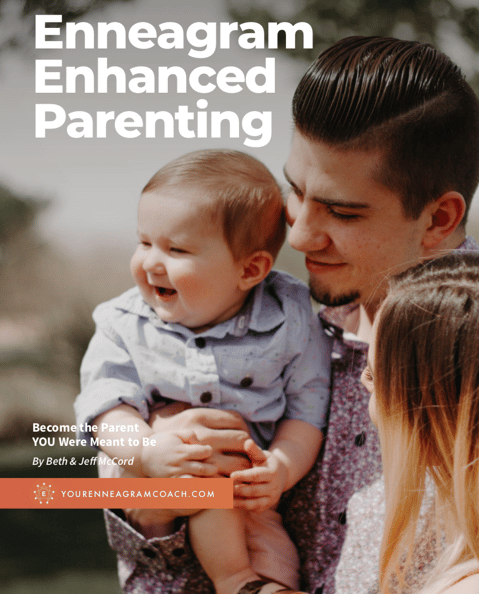I first heard the word "enneagram" a couple of years ago from a friend that was reading a book about it. To be honest, I didn't know how to say or spell it correctly for several more months after that (now I know it's pronounced 'any-a-gram'). All I knew was that it had something to do with numbers and personalities.
Since then, though, I haven't stopped hearing about it...all over the place. There are books, podcasts, social media accounts, workshops, organizations and more all dedicated to the enneagram. The more I heard about it, the more I wondered:
What is the enneagram?
I started to poke around on the internet looking for enneagram descriptions and definitions and resources, and I quickly discovered that there is ample information out there. What I basically gathered was that the enneagram is a personality-typing tool that identifies nine basic personalities. It is different than other personality-focused systems and programs in that the enneagram focuses largely on one's core fears and motivations.
What is the point of the enneagram?
If you know your personality type (or "number"), the enneagram can be a helpful tool that points to why you do what you do and respond to situations the way that you do. This can prove especially helpful in relationships, too, if you understand other people's core fears and motivations.
In my digging, I started reading through descriptions of the nine basic personalities (to figure out my own number, of course). It became evident that different resources use unique language to describe the nine personalities--there is no one definitive enneagram language--but the general concepts are the same. Here are basic descriptions of all nine types based on a few different resources:
Enneagram Type 1 - referred to as the perfectionist or reformer
Enneagram Type 2 - referred to as the helper or supportive advisor
Enneagram Type 3 - referred to as the achiever or performer
Enneagram Type 4 - referred to as the individualist or the romantic
Enneagram Type 5 - referred to as the investigator, intellectual or observer
Enneagram Type 6 - referred to as the loyalist or loyal skeptic/guardian
Enneagram Type 7 - referred to as the enthusiast or optimist
Enneagram Type 8 - referred to as the challenger or protector
Enneagram Type 9 - referred to as the peacemaker or mediator
I read bits and pieces on each of the numbers, but I wondered:
How do I find out my enneagram number?
There are many online enneagram tests available, most for free. While taking one of these online tests may point you in the right direction of identifying your number, enneagram experts are quick to point out that ultimately only you can identify what motivates you and drives you.
When I first started reading up on the enneagram, a few different numbers resonated with me. There were elements of Types 2 and 3 that made me wonder if perhaps one of those is my number. After further digging and self-reflection, I accepted the fact that I am a 7, the enthusiastic optimist. Over time, I started discussing all of this with my husband (he figured out that he's an 8), and it has really given us language to describe our internal worlds, further explore who God has made us to be, and relate to each other better. And as a parent, I've begun to ask:
How can parents use the enneagram as a parenting tool?
My two kids are still quite young, but I find myself wondering at what age or season of life do personality types become evident. I want to be able to understand my kids and raise them "in the way that they should go," as unique individuals that God has created with purpose and gifting and calling. I also want to help them identify and navigate their fears and what drives them, as well as their strengths and weaknesses, as they grow older.
To get some answers to my wonderings, I reached out to Beth McCord, founder of "Your Enneagram Coach," an organization that offers enneagram courses, books, and other resources on the enneagram with a Christian approach. One of those resources is "Enneagram Enhanced Parenting" in which Beth and her husband Jeff offer wisdom to parents.
McCord first recommends that parents become acquainted with their parenting personality so as to avoid common pitfalls cultivate positive attributes to be the best parent God created us to be.
McCord also encourages parents to seek to deeply know their children. By learning a child's type, we as parents can better love them and relate to them. Because each individual is the only one that can ultimately identify their true motivations, we cannot type our kids for them, especially at early ages. McCord recommends keeping 2-3 types in mind for each child until they are able to articulate their own fears and motivations (in late teens).
"Enneagram Enhanced Parenting" also offers several questions for each type that we as parents can consider as we interact with our children and watch them respond to the world around them.
If you would like to read/download/print the "Enneagram Enhanced Parenting" resource, check it out here and make sure to check out the "Your Enneagram Coach" website to learn more:

The enneagram is not an explain-all solution to all of our parenting and interpersonal needs; it is simply a tool that can aid in our understanding of ourselves and others. I am so thankful for the promise of Jesus in giving us His Spirit that guides us into all truth (John 16:13) as we navigate raising our kids in His light and life. And I am thankful that no matter what type of personality we have or what our family dynamics are, we have a Heavenly Father that we can rely on for wisdom, insight, and strength to raise our children well.
/Logos/Horizontal%20Academic%20Logo%20for%20Light%20Backgrounds.png)
/Logos/Horizontal%20Academic%20Logo%20for%20Dark%20Backgrounds.png)



